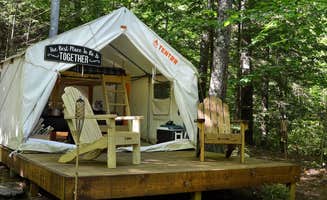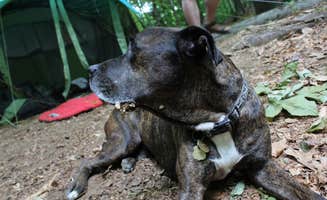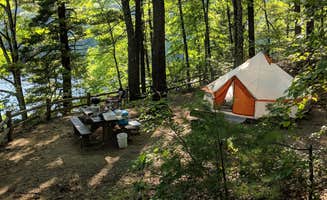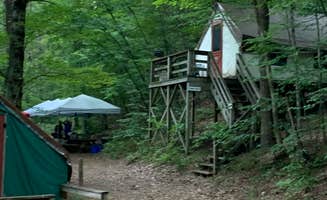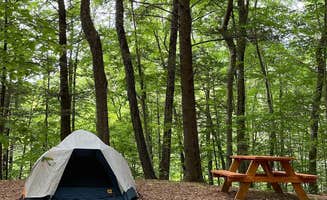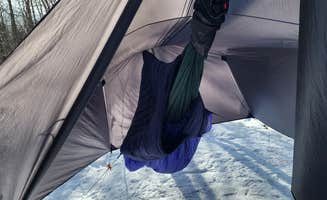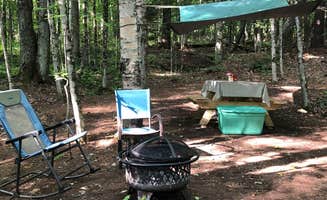Tent campsites near Dublin, New Hampshire offer primitive camping experiences within New Hampshire's southwestern region, averaging 1,300 feet above sea level. The area sits along the Monadnock Highland region where temperatures can drop below 50°F even during summer nights. Camping locations range from traditional tent sites with dedicated platforms to more rustic walk-in locations that require hauling gear short distances from parking areas.
What to do
Paddle on Tully Lake: At Tully Lake Recreation Area in nearby Massachusetts, campers can explore multiple islands and secluded shoreline areas. "We take our canoe and spend the whole day at the lake. You can find lots of private areas to swim, pick blueberries and relax," notes visitor Ben P. The recreation area offers canoe, kayak, and paddleboard rentals for those without their own equipment.
Hike Soapstone Hill: Located near Federated Women's Club State Forest, this trail offers views of Quabbin Reservoir about 30 miles southwest of Dublin. "If you continue past site 15, you'll head through Gate 36 out toward Soapstone Hill which offers a great view of Quabbin Reservoir and sunsets," writes Jean C. The area contains numerous cellar holes, remnants of towns flooded in the 1930s to create the reservoir.
Visit Doane's Falls: This series of cascading waterfalls near the camping areas creates multiple swimming opportunities. "The highlight was Doane's falls, a very quick walk from the campground area," notes Jean C. about her visit to Tully Lake Recreation Area. The falls feature five distinct drops along an ascending wooded path suitable for children and casual hikers.
What campers like
Privacy between sites: Many campsites around Dublin offer significant separation between camping areas. At Maple Ridge Farm just across the Vermont border, "Very lush campground, plenty of space and privacy between sites," reports Les R. Some campgrounds use natural vegetation and terrain features to create isolation between neighboring campers.
Car-free camping experience: Several campgrounds maintain vehicle-free policies at the actual sites. "No cars at all at the campsites, which was great for peace of mind as our toddler roamed around. It also made for a super quiet stay," explains Megan G. about Tully Lake, where sites remain free from traffic noise and exhaust.
Island camping options: For those seeking extreme seclusion, several area campgrounds offer island sites. "I stayed on the island site, which was absolutely amazing. The views are to die for, and it's really meant for people who want to be outdoors in the woods," shares Kris M. These sites typically require advance booking, sometimes months ahead during peak season.
What you should know
Reservation timing crucial: Popular campgrounds fill quickly during prime months. "The sites fill up weeks out (and can completely fill the day registration opens, which is date-dependent each year...Booking for Memorial Day meant I booked in April)," warns Kris M. Some facilities like Barton Cove Campground operate only from Memorial Day through Labor Day.
Limited cell service: Most camping areas have poor or nonexistent mobile coverage. "Cell phone coverage is faint to nonexistent on Verizon. You may want to download offline maps before you head out here," advises Jean C. about camping in the region. This isolation requires advance planning for navigation and emergency communications.
Cart-hauling required: Many sites require transporting gear from parking areas. "You park at the entrance, grab a key to unlock the gate, drive to the campground, unlock gate, drive through gate, lock gate, unload your stuff, drive to gate, unlock gate, drive through gate, lock gate, return key, drive back to campground, walk to your site," explains Brie B. about the logistics at one location. Some facilities provide carts or ATV assistance for gear transportation.
Tips for camping with families
Choose sites close to facilities: With children, bathroom proximity matters. "Our site was fairly far from services, long run with small kids in the middle of the night. Not our favorite place," cautions Lauren A. about her experience at Tully Lake. When booking, request information about distance from amenities if traveling with young children.
Look for car-free zones: Lost Boys Hideout and similar sites offer safer environments for families with active children. "Nice new tents provided at Sleepy Hollow site. Improvements to the firepit, area all mulched, even some games and water are provided!" notes Steve K. about recent upgrades that benefit families.
Pack weather-appropriate clothing: The elevation around Dublin means temperatures can vary significantly between day and night, even in summer. Layers and extra blankets remain essential, particularly for children camping in the spring or fall when overnight temperatures frequently drop below freezing.
Tips from RVers
Limited hookup options: The Dublin region primarily caters to tent campers, with few dedicated RV facilities. At Military Park New Boston Air Force Station Recreation Area, reservations are possible but amenities remain minimal. "Great Outdoor Place! Nice scenery with fresh air and freedom sunshine!" reports Shuang W., but the facility lacks hookups or waste disposal options.
Consider seasonal closures: Many campgrounds around Dublin close entirely during winter months. Those remaining open typically shut off water systems from October through April due to freezing temperatures, requiring self-contained water supplies and waste management.
Pack leveling equipment: The mountainous terrain throughout the region means many sites sit on uneven ground. RVs require substantial leveling blocks and stabilizers, with some campgrounds restricting RV access entirely due to steep access roads and limited turning radius at campsites.


